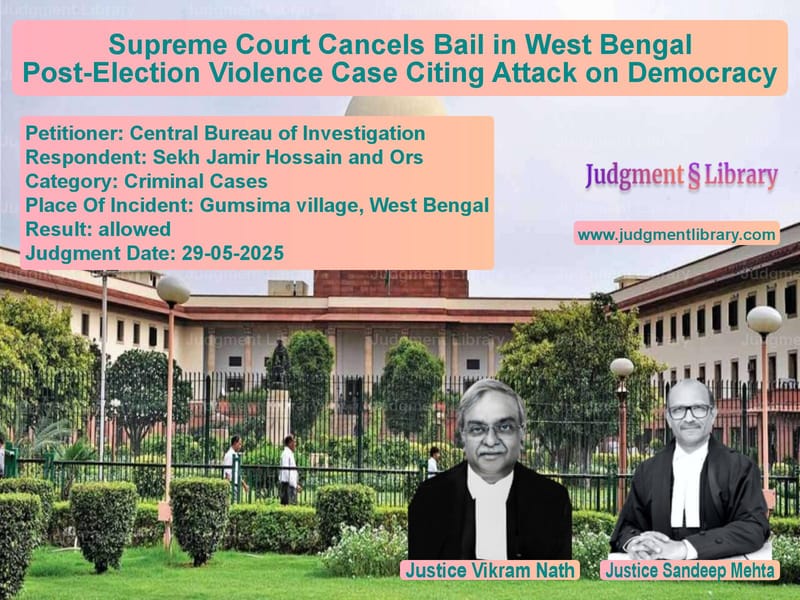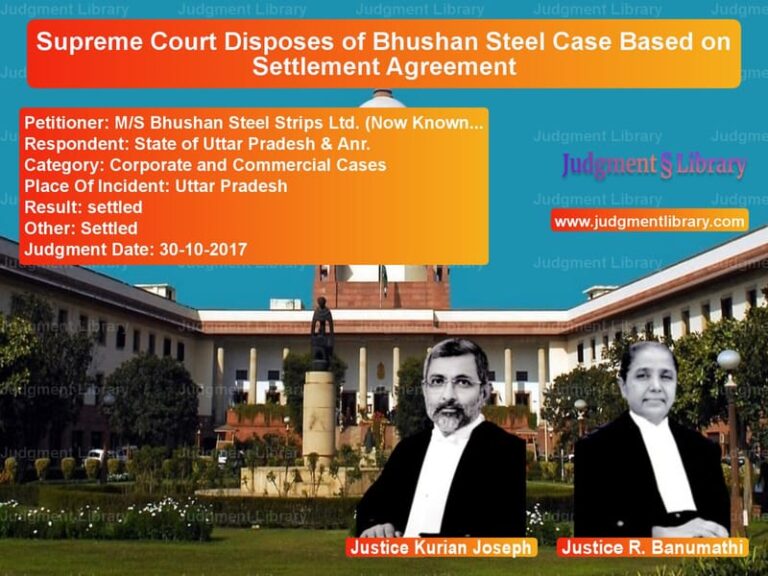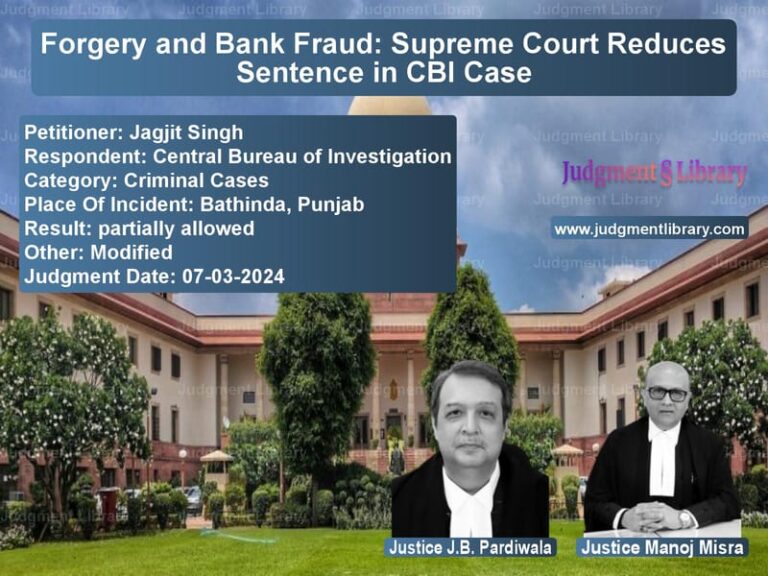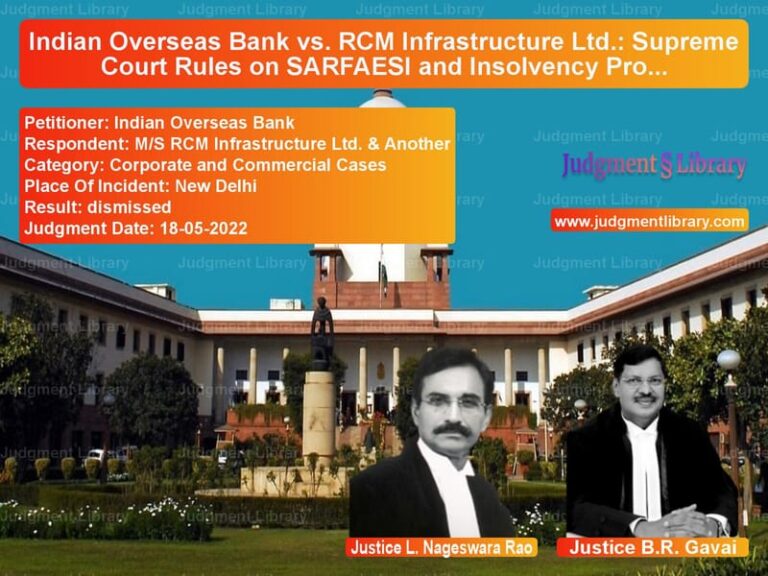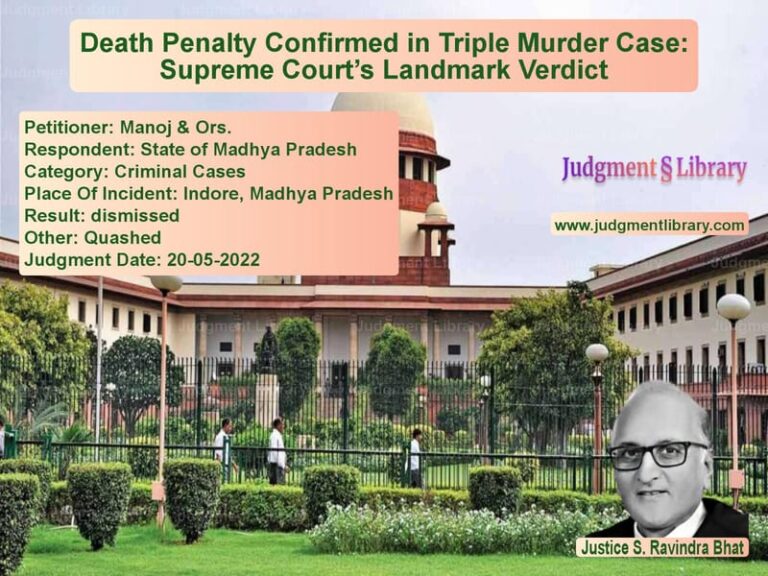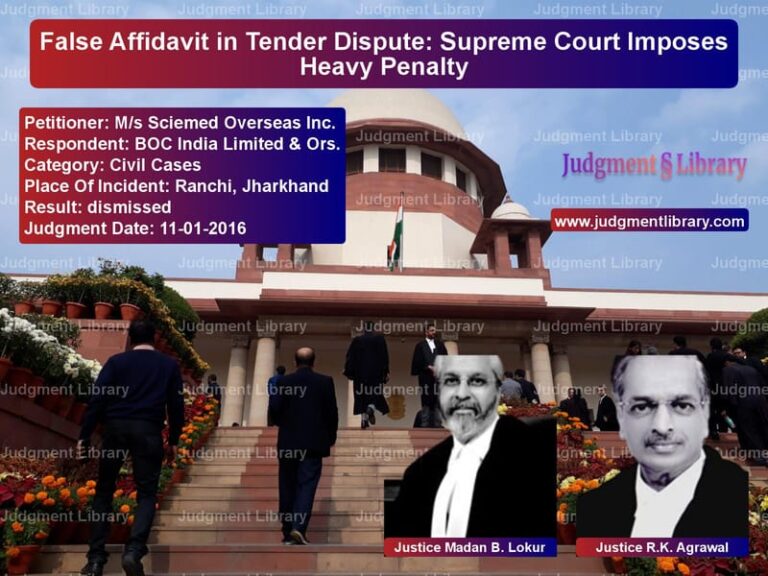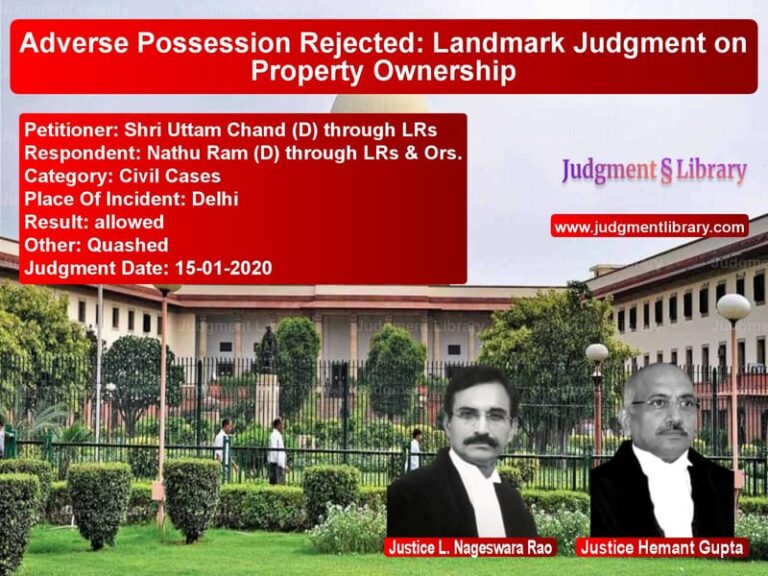Supreme Court Cancels Bail in West Bengal Post-Election Violence Case Citing Attack on Democracy
In a powerful judgment that underscores the sanctity of democratic processes and the protection of citizens’ fundamental rights, the Supreme Court of India has taken a firm stand against political violence by canceling the bail granted to accused persons involved in a horrific post-election attack in West Bengal. The case, which came before the apex court as an appeal by the Central Bureau of Investigation (CBI), reveals a disturbing narrative of political vendetta, police inaction, and brutal violence targeting political opponents in the aftermath of state assembly election results.
The incident that forms the basis of this legal battle occurred on May 2, 2021, immediately following the announcement of West Bengal Assembly election results. According to the FIR registered by the CBI, the complainant, a resident of Gumsima village in West Bengal, alleged that he and his family became targets of brutal violence because they had supported and campaigned for the Bharatiya Janata Party during the elections. The complainant, belonging to the Hindu religion and part of a minority community in his village, stated that he faced threats and intimidation even before the elections, culminating in a bomb being thrown at his tea stall.
However, the situation escalated dramatically on the day election results were declared. As described in the FIR, “a gang of miscreants led by Sekh Mahim s/o Sekh Jalil, a leader belonging to the ruling dispensation from village Gumsima, PO Jatra gathered together and started throwing bombs towards the house of the complainant. It is alleged that around 40 to 50 miscreants, who were heavily armed, launched an offensive on his house. The assailants were carrying weapons like sticks, knives, iron rods, revolvers, etc. and started assaulting the complainant and his family members.”
The violence took an even more horrifying turn when the attackers targeted the complainant’s wife. The FIR records that “the wife of the complainant was grabbed by hair, her clothes were snatched away, and she was forcibly undressed. The assailants indulged in molesting the complainant’s wife by inappropriately touching her private parts.” In a desperate act of self-preservation, the victim “poured kerosene oil on her person and threatened that she would set fire to herself on which the miscreants left the spot.”
What makes this case particularly alarming is the subsequent handling by local authorities. The complainant and his family, after escaping from the village, approached the Sadaipur Police Station the next day to file a complaint. Shockingly, “the officer-in-charge of the police station did not accept the complaint and advised the complainant to leave the village to save his and his family’s life.” This initial police inaction set the stage for a prolonged legal battle that would eventually reach the highest court of the land.
The case gained momentum when multiple victims of similar post-election violence filed writ petitions in the Calcutta High Court. The High Court, recognizing the gravity of the situation and the apparent failure of local police to act, intervened significantly. In its order dated August 19, 2021, the High Court directed the CBI to investigate all cases where allegations involved murder and/or crimes against women regarding rape or attempted rape. This directive led to the registration of FIR No. RC0562021S0051 on December 16, 2021, for offenses including unlawful assembly, vandalism, grievous hurt, and attempted rape.
The CBI’s investigation led to the arrest of the respondents on November 3, 2022, and the filing of a chargesheet against multiple accused persons. However, the Calcutta High Court subsequently granted bail to the respondents through orders dated January 24, 2023, and April 13, 2023, which became the subject of challenge before the Supreme Court.
ARGUMENTS BEFORE THE SUPREME COURT
The CBI, represented by Additional Solicitor General Mr. Vikramjeet Banerjee, presented compelling arguments for canceling the bail. Mr. Banerjee submitted that “the High Court granted bail to the respondents on totally extraneous considerations. The fact remains that there is no possibility of a fair trial being conducted because the respondents are politically influential and they even managed to prevent the registration of the FIR in respect of such ghastly crimes.”
He emphasized the challenging circumstances of the investigation, noting that “the FIR in the present case could be registered that too by the CBI only after the High Court intervened in the matter and passed directions to register the FIRs vide judgment dated 19th August, 2021.” The ASG further highlighted the ongoing challenges in conducting a fair trial, stating that “the respondents are influencing the trial and are not letting the proceedings to be continued. On numerous dates of hearing, the accused respondents have failed to appear before the trial Court, which is struggling to even frame the charges against the accused respondents.”
Mr. Banerjee urged the Court to consider the broader implications, arguing that “looking to the nature and gravity of the allegations and the propensity of the accused respondents to abscond and/or adversely affect the proceedings of the trial and the imminent probability of the witnesses being threatened and tampered, the High Court should have refrained from granting bail to the accused respondents.”
In opposition, the counsel for the accused respondents defended the High Court’s decision to grant bail. He contended that “the High Court has analysed the factual matrix in an apropos manner while distinguishing the case of the respondents and enlarging them on bail. The fact remains that neither in the highly belated FIR nor in the statement of the witnesses recorded by the Investigating Officer, any specific role has been assigned to the respondents herein and thus, there is no justification for entertaining these appeals and interfering with the well-reasoned order passed by the High Court granting bail to the respondents.”
COURT’S LEGAL ANALYSIS AND REASONING
The Supreme Court, comprising Justices Vikram Nath and Sandeep Mehta, began its analysis by revisiting the settled legal principles governing bail cancellation. The Court observed that “Law is well-settled by a catena of decisions of this Court that the considerations for grant of bail and cancellation thereof are entirely different. Bail once granted to the accused should normally not be interfered with/cancelled unless there exist circumstances giving rise to an inference that the bail has been procured by practicing fraud or mis-representation; that the allegations against the accused are so grave that the same have an adverse impact on the society at large and shake the conscience of the Court; that releasing the accused respondents on bail is likely to create a sense of fear and terror amongst the society or that the accused while on bail may abscond or tamper with the prosecution evidence.”
Applying these principles to the facts of the case, the Court expressed deep concern about the nature of the offenses. The judges noted that “the present one is a case wherein the allegations against the accused respondents are so grave that the same shake the conscience of the Court. Furthermore, there is an imminent propensity of the accused persons adversely affecting the proceedings of the trial.”
The Court found particularly troubling the initial police response to the complaint. It noted that “the complainant approached the Sadaipur Police Station on 3rd May, 2021 for registering a complaint in respect of incident dated 2nd May, 2021, but the officer-in-charge refused to register the FIR conveying that he and his family members should go away from the village for their own safety. Apparently, this approach of the local police lends credence to the apprehension of the complainant about the clout and influence which the accused respondents bear over the locality and even the police.”
In a significant observation that underscores the case’s importance beyond the individual incident, the Court characterized the attack as “nothing short of a grave attack on the roots of democracy.” The judges elaborated on this crucial point, stating that “the concerted attack on the complainant’s house was launched on the day of election results with the sole objective of wreaking vengeance because he had supported the saffron party. This is a grave circumstance which convinces us that the accused persons including the respondents herein were trying to terrorize the members of the opposite political party whom the accused respondents were supporting. The reprehensible manner in which the incident was perpetrated shows the vengeful attitude of the accused persons and their avowed objective to subdue the supporters of the opposite party into submission by hook or by crook.”
The Court’s assessment of the evidence revealed a prima facie case against the accused respondents. It found that “there is prima facie material to establish that the accused persons formed an unlawful assembly and launched a concerted attack on the house of the complainant vandalising the same and looting away the household articles. The complainant’s wife was viciously pulled by the hair and was disrobed. The accused persons were about to assault her sexually when the lady gathered courage to pour kerosene on her body and gave a threat of self-immolation on which the accused persons including the respondents herein fled away from the complainant’s house.”
The procedural history of the case also weighed heavily in the Court’s decision. Noting that “the charge-sheet has been filed way back in the year 2022 and till date, the trial has not budged an inch,” the Court accepted the prosecution’s allegation “that this delay is mostly attributable to non-cooperation by the accused persons including the respondents herein which fact is palpably established from record.”
COURT’S DECISION AND DIRECTIONS
Based on its comprehensive analysis, the Supreme Court concluded that “in this background, we feel that there is no possibility of a fair and impartial trial being conducted, if the accused respondents are allowed to remain on bail. Thus, on both counts, i.e., (i) the nature and gravity of the offence which is nothing short of an attack on the roots of democracy and (ii) the imminent likelihood of the accused adversely affecting a fair trial, the bail granted to the accused respondents has to be cancelled.”
The Court consequently allowed the CBI’s appeals and reversed the High Court’s bail orders. In its operative directions, the Court ordered that “the bail granted to the accused respondents by the High Court is accordingly cancelled. The accused respondents shall surrender before the trial Court within two weeks from today, failing which, the trial Court shall adopt coercive measures to secure their presence. Upon surrendering/being arrested, the accused respondents shall be remanded to custody.”
Recognizing the need for expeditious justice, the Court issued specific timelines for the trial, directing that “the trial Court shall expedite the proceedings and will try to conclude the trial within a period of six months from the date of receipt of a copy of this order.” The Court also took note of the potential threat to witnesses, ordering that “the Home Secretary, State of West Bengal and the Director General of Police, State of West Bengal shall ensure that proper protection is provided to the complainant and all other material witnesses so that they can freely appear and depose at the trial without any fear or apprehension.”
The judgment represents a significant reinforcement of legal principles in cases involving political violence and attacks on democratic processes. By canceling the bail and emphasizing the gravity of offenses that strike at the “roots of democracy,” the Supreme Court has sent a clear message about the judiciary’s role in protecting democratic values and ensuring that political differences are never resolved through violence and intimidation.
This case also highlights the crucial role of independent investigative agencies like the CBI in situations where local law enforcement fails to perform its duties. The Court’s endorsement of the High Court’s initial decision to transfer the investigation to CBI, and its subsequent support for the agency’s efforts to ensure a fair trial, underscores the importance of institutional mechanisms in upholding the rule of law, particularly in politically sensitive cases.
The Supreme Court’s firm stance in this matter serves as an important precedent for dealing with post-election violence and protecting the fundamental right of citizens to participate in democratic processes without fear of retribution. The judgment reaffirms that in a constitutional democracy, political allegiance should never become a license for violence, and that the judiciary will intervene robustly to protect the democratic framework of the nation.
Petitioner Name: Central Bureau of Investigation.Respondent Name: Sekh Jamir Hossain and Ors.Judgment By: Justice Vikram Nath, Justice Sandeep Mehta.Place Of Incident: Gumsima village, West Bengal.Judgment Date: 29-05-2025.Result: allowed.
Don’t miss out on the full details! Download the complete judgment in PDF format below and gain valuable insights instantly!
Download Judgment: central-bureau-of-in-vs-sekh-jamir-hossain-a-supreme-court-of-india-judgment-dated-29-05-2025.pdf
Directly Download Judgment: Directly download this Judgment
See all petitions in Bail and Anticipatory Bail
See all petitions in Attempt to Murder Cases
See all petitions in Judgment by Vikram Nath
See all petitions in Judgment by Sandeep Mehta
See all petitions in allowed
See all petitions in supreme court of India judgments May 2025
See all petitions in 2025 judgments
See all posts in Criminal Cases Category
See all allowed petitions in Criminal Cases Category
See all Dismissed petitions in Criminal Cases Category
See all partially allowed petitions in Criminal Cases Category

